- Home
- Nancy Pickard
The 27-Ingredient Chili Con Carne Murders: A Eugenia Potter Mystery Page 10
The 27-Ingredient Chili Con Carne Murders: A Eugenia Potter Mystery Read online
Page 10
“All right, but how did you even know I live in Arizona, Jed, much less on a ranch in this valley? It’s been so many years. I have to admit that I haven’t known a thing about you, where you were, or what you were doing. How could you have known I was here?”
“But I’ve always known where you were, Andy. No matter what, you must have known that. I’ve always known where you were. Every year, every move, every child. I’ve always known.”
It was said so simply, so straightforwardly.
And it left her speechless.
“Say, what’s that noise I’m hearing?” he asked, rescuing her from her own silence.
“That clicking?” she managed to blurt out. “Party line.”
His reply made him sound as incredulous as she was over his previous comment. “In this day and age?”
“Yes. Welcome to the past, Jed.”
There was a moment of silence as they both seemed to weigh the double meaning of her quip. With no further interruptions on the line as the rain squall passed by, and no further clicks, she managed to invite him to visit her ranch the next day.
“That’s very kind of you, Andy, but Che—Mrs. Thomas—has told me something of your troubles there. I’d be in the way.”
“No, you’d be doing me a favor, Jed. Che must have told you that my ranch manager and his granddaughter are still missing. I can’t be much help in the actual search tomorrow, and if I stay around here all day by myself, I’ll go crazy. I would appreciate your company.”
“Really?”
“Really.”
“Well, then, yes, of course I’ll come.”
“Ordinarily, I’d suggest a time,” she went on. “Lunch or dinner or some such. But there’s no telling what tomorrow will bring, so my best advice is to come when you feel like it, as long as it’s any time after noon. I have to run into town before that. Che will give you directions, and probably a car if you need one, or even one of the ranch pickups. I’m afraid that if we don’t have good news by the time you arrive, I may not be the best of company. But I will be here. And I would like to see you, Jed.”
“I’ll admit this isn’t quite the reunion I envisioned.”
“No.”
“And I know the reunion you’d really like to have tomorrow is the one with your missing employees.”
“Yes.” She thought it sensitive of him to acknowledge that. “I must tell you they’re much more than employees; they’re friends, very nearly family.”
“I’m so sorry. Are you sure …?”
“I’m sure.”
“Tomorrow, then.”
“Good night … Jed.”
Mrs. Potter hung up the receiver and then got up and wandered into her bedroom in a bit of a daze, hardly feeling the carpet on the soles of her feet. She sank down on the edge of her bed, and felt a transformation take place inside herself.…
Suddenly, Mrs. Potter, la patrona of Las Palomas, was Eugenia Andrews of Harrington, Iowa. And it was no longer early May in Arizona, where she was faced with horrifying, heartbreaking adult responsibilities. It was October in Massachusetts and she was a freshman at college, and a voice she had not heard since then was speaking to her as if the years between them had not existed.…
Andy.
It had always sounded like An-day when he spoke it.
Her bedroom in Wind Valley disappeared in a mist of memory.
Suddenly, the world was new and she was eighteen again and in love, or so she thought, with a clear, slightly nasal, upper-class Boston accent.
Jed and Andy.
They had met one sunny Saturday in early fall, introduced by her roommate, Gussie, and her roommate’s brother. From the time of their meeting, both the brother and the roommate had been ignored and forgotten. All during that magical autumn, she and Jedders H. White had spent as much time together as their college schedules permitted, sailing on the Charles, walking hand in hand on Boston Common, strolling rain-wet brick sidewalks, feasting on steamed clams and lobsters—which he had shown the girl from Iowa how to eat—and on White Tower hamburgers when their allowances ran low.
In a daze of first love, Eugenia Andrews spent that autumn in a dream. “I’m in love!” she awoke each morning to remind herself. “I’m in Boston! I’m in college!”
And then the dream, the dazzlement of first love, the thrill of city life, the first excitement of intellectual challenge, lost some of its wonderment. Mrs. Potter could scarcely recall now just what had happened between her and Jed. Some misunderstanding, she supposed, which perhaps one of them had thought trivial, and the other had thought important, and then almost as suddenly and magically as they had fallen in love, they had fallen out of it.
It had been painful for both of them, she remembered, but then spring came and there was another, though much less electrifying, young man, and then another. And then she had returned home to the summer joys of her own Blue Lake, and then off to another fall at college. And then Lew. She never had a regret during all the long good years of their marriage, and almost never had even a fleeting thought of that first love. Except when I fly into Boston, Mrs. Potter corrected herself. Sometimes at Logan Airport she might suddenly imagine she caught sight of that tall, thin figure, might sometimes imagine she heard that mixture of softness and twang that New England had given to his speech.
All right, she admitted, there was a folk song (or was it the Beatles?) she never heard without thinking of Jed. Something about seeing fire and rain, I always thought we’d meet again. Something like that. To be honest now at last, she knew she really had always expected that sometime they would meet again.
But not like this.…
Mrs. Potter felt herself transported back into the present again, along with all of its attendant weariness and worries, aches and pains. And age. Ah, but for a few moments there, she’d found that magic elixir in memories of her own youth. She told herself to stop being absurd. She was seated on her double bed, not on a narrow cot in a college dormitory. And the man who called was not the boy she had loved. This man, nice as he sounded, would prove to be happily and appropriately married to a wonderful woman and the doting father of several children, pictures of whom she would see when he pulled them out of his wallet tomorrow. He would be a lawyer by now, possibly a partner in some old Boston firm; or maybe a doctor. He probably played squash at his club twice a week, and jogged the other days, and he would—should—be on the phone right now telling his wife about the nice old college friend he’d managed to find “way out here in the sticks, could you believe it?”
Mrs. Potter glanced at her watch.
Well, no, it was later in the East, so he had probably either already called his wife this evening, or he would talk to her in the morning, and why was she, Mrs. Potter, concerned about that anyway?
It would be nice to see him tomorrow; she and he would have a nice, reminiscent chat, that was all.
Mrs. Potter got up from the bed and went to stand beside one of her bedroom windows that looked out on the Rimstone Mountains. At least it had stopped storming, but she knew the spring winds whipped cold and harsh through the arroyos. She thought of Linda and Ricardo being somewhere out there, who knew where, and in goodness only knew what condition. It was those two dear people whom she’d give nearly anything to see tomorrow, and not, with all due respect, some long-lost boyfriend of hers.
“Dónde están?” she murmured.
Where are they?
Before she went to bed she remembered to put two pounds of dry pinto beans in water to soak so that they’d be ready for the chili the next day.
CHAPTER 12
Worry could have kept Mrs. Potter awake all night, but sheer exhaustion drove worry to its knees, defeating it. She slept without stirring, until her alarm sounded at 5 A.M.
When she opened her eyes, it was to a dark bedroom.
She felt unaccountably happy and didn’t know why until the name “Jed” floated into her consciousness. But that immediately brought with it a recollec
tion of the rest of yesterday, like a movie played backward, and the happiness instantly gave way to fear. There had been no phone call from Juanita to wake her during the night, no jubilant voice reporting, “They’re home!”
Mrs. Potter didn’t reach out a hand to press the “snooze” button to give herself an extra five minutes of rest. Nor did she allow herself her usual pleasure of a prolonged gaze out the window at her beloved Rimstone Mountains. She rose immediately from bed and padded across the carpet to the bathroom.
There were many things to be done this morning.
Moving briskly, impatient with the morning stiffness of her own fingers and legs, Mrs. Potter shed her nightgown and slipped into a pair of light wool navy-blue trousers, a rose-colored cotton turtleneck and a navy cardigan. Navy-blue stockings and good, comfortable walking shoes went on next. Mrs. Potter did up her silver-blond hair in its customary neat knot, selected small gold ball earrings, and then applied a dab of gray eye shadow on each lid, and a touch of color to her mouth. Giving a quick thought to the idea that she might be seeing Jed White that day before she ever had a chance to freshen up, she applied a dab of perfume behind each ear and at her throat and wrists.
“I would do this anyway,” she defended herself to her mirror.
Mrs. Potter stepped back to take a look at herself.
“My, dear,” she recalled her grandmother saying, “thanks to the blessings of paint and powder, it is nearly always possible for a woman to look better than she feels.”
Mrs. Potter decided her mirror gave certain proof of that.
Her yard was still dark when she walked to the carport. She kept to the flagstone path and then to the gravel, as she’d never quite conquered a fear of snakes literally in the grass. Arizona sheltered several poisonous varieties—rattlers, for one—and millions of rocks for them to hide beneath. They were one of the dangers she preferred not to think about in regard to Linda and her grandfather.
She backed out of the carport and then headed southeast on a well-worn dirt road that wound through several pastures and required her to open and close a few gates. By the time she’d climbed out of her car for the sixth time, and closed the third gate, she was as wide awake as only exercise and cold morning air could make her. She was also regretting the fact that she hadn’t paused long enough for her usual cup of hot tea, or brought along a Thermos of coffee.
She never would have guessed it had stormed the night before. Several hours of dry desert wind had absorbed the puddles like a sponge. By now, she thought, our excess moisture is on its way to Kansas. The dirt beneath her tires was dry and the little arroyos she crossed were exactly what their name meant in English: dry washes. If Ricardo or Linda had been soaked by the deluge, they’d be dry by now, but cold. The morning was very crisp, and that wonderful fleece-lined jacket of Linda’s wouldn’t protect her fingertips or her toes from the chill. Ricardo, Mrs. Potter knew, had a habit of going out in almost any weather with only chaps and a fleece-lined leather vest for protection. Both of them had probably worn long underwear for their early-morning ride, and Ricardo wore kid gloves for riding—most cowboys did—and he’d have on his hat. Mrs. Potter could see it in her mind’s eye: a glorious battered black work hat, a Stetson with its side brims rolled high and a hammered silver band. Juanita claimed that band was big enough to blind cows when the sun hit it. Ricardo only laughed at that and agreed it was his secret technique to get cattle and people to obey him: blind ’em and hypnotize ’em. Mrs. Potter’s eyes filled with tears as she smiled at the memory of their marital banter.
The sun had barely begun to frame El Bizcocho when she drove over a small rise and saw the now-defunct windmill, which sat down in a hollow with a strange topographical characteristic: although steep hills rose around it, there were narrow passages through those hills, which formed wind tunnels that still whipped the broken vanes around like a child’s top in a cyclone. When she and Lew bought the ranch they found more efficient access to water, so they let nature turn the windmill into a picturesque artifact that their amateur-artist friends adored to capture in watercolors. Mrs. Potter found it amazing that the windmill still stood, but she knew it was set deep and built of a nearly indestructible hardwood back in the days when people built things right the first time. Sometimes she entertained the notion of restoring it to its original use, partly for ecological reasons, but mostly as a sentimental tribute to its good old days.
She’d selected it as the gathering place because it was situated nearly dead-center in the ranch. From there, the searchers could fan out efficiently in every direction.
The wind was whipping good this morning, as the locals said, and even in her closed car she could hear the windmill creaking, moaning like something alive. She saw Charlie Watt talking to Ken Ryerson. Both men had their hands on their Stetsons, to hold them on. Other volunteers were showing up early, and either staying in their vehicles or huddling in small, quiet groups in the lee of the hills. Most of last night’s visitors were present this morning. It looked to her as if everybody had come equipped for any eventuality, whether that be traversing rough country in a truck or going cross-country on horseback, or even the possibility of violence, to judge by the number of firearms attached to back windows. It was also true that under many of those driver’s seats a person would find a handgun if she were inclined to look. Guns were a way of life out West, where ranchers liked to be prepared to shoot varmints, particularly the dangerous wild dogs that threatened livestock. Mrs. Potter herself had resisted all efforts—by Lew, by Ricardo, even by women like Juanita and Che—to tote her own pistol. “There is no boot leather thick enough to guard against the probability that I would shoot myself through it,” she told them, “and no side of a barn so big I can’t miss it.”
Marjorie McHenry waved at her, stiffly, and she waved back.
She noticed that Marj and Rey had brought along three burly men who provided security for them on the ranch. Mrs. Potter was grateful for the extra help, but she did wonder whether it was intended for Ricardo’s benefit or to protect the McHenrys while they were out in the open. What an awful way to live, she thought, and wondered why on earth they needed bodyguards. What did they fear could happen to them? That was something everybody in the valley craved to know and nobody ever seemed to find out. All they ever got out of the tight-lipped McHenrys was a cryptic cliché along the lines of “You can’t be too careful.” And all they got out of the Highlands employees, almost all of whom appeared to be imported from out of state, was a vague “I wouldn’t be able to say” or “I wouldn’t know about that.”
Mrs. Potter waved at Lorraine Steinbach, but didn’t see Gallway.
Rattling noises coming from behind her startled her. Mrs. Potter checked her rearview mirror and spotted a small parade coming her way, an all-black cavalcade of pickups and Jeeps, each with the C Lazy U brand painted on its doors. Che Thomas, true to her word and bless her heart, appeared to have sent a small army of her dude ranch guests and employees.
Mrs. Potter hoped that Jedders H. White wasn’t one of them.
Granted, it would be nice of him to help.
But it would be awkward to hold a forty-year reunion under the eyes of her curious (not that she’d blame them) neighbors. Mrs. Potter held her breath a bit until every black vehicle had parked in the grass and every occupant had alighted and not one of them appeared to be a tall, thin, handsome college boy forty years later.
She saw Ken suddenly walk away from Charlie, looking as if he was mad about something. The younger man stomped over to the covey of vehicles, while Charlie, still holding on to his hat, followed at a more leisurely pace. The older man noticed Mrs. Potter, and waved, a gesture she returned. Several of the other volunteer searchers raised their hands in greeting to her, too, and she returned their salutations, although her own right arm felt as heavy as her heart.
She drove on toward the cluster of vehicles, passing Ken en route.
As soon as she parked, between two ocotillo shru
bs, there was a knock at her window. She turned to see the tanned and handsome visage of Che Thomas smiling in at her. Che was dressed in layers, as if she expected to be out all day from the chill of the morning on toward the peak of the afternoon. Above the window line Mrs. Potter saw a black down jacket with the C Lazy U insignia over a black sweater, over a black shirt, and she expected there were black pants and black socks and black boots below the window line. All that black made a dramatic frame for Che’s short-cropped white hair, the huge turquoise brooch at her neckline, her turquoise-blue eyes and the high color of her cheeks and lips. Mrs. Potter rolled down her window, letting in a dusty gust of cold wind and a breeze of perfume.
“Told you.”
“Thank you, Che, I really appreciate the help—”
“No, no.” The other woman laughed. “I mean to say, I told you that you’d like my surprise. My God, Genia, you’re blushing. I can’t believe it, at your age. I thought maybe he’d come with us this morning, but he said he’d wait to see you this afternoon.” Her elegant white eyebrows arched inquisitively. “This afternoon, hmm?”
“What’s he like, Che?”
Che grinned. “Ugly as sin. Fat as a marshmallow. Face like a javelina pig. Gets around with a walker. Talks about his prostate all the time. Can name every game show host on television.” The grin widened. “You’ll just love him, Genia.”
“I may kill you for this, Che.” Mrs. Potter experienced a sudden, overwhelming desire to change the subject. “You’re not really going out there, are you?”
“You bet I am, kiddo. I may be as old as these hills, but I’ve still got eyes that can tell an eagle from a hawk, and even shoot the right one when they’re flying a thousand feet up. Don’t you forget I was raised here. I’m a tough old country broad, Genia, not like you sissified Philly types.” Che smiled at her with eyes full of mischief. “Besides, I’ve known Ricardo longer than anybody else here except maybe Charlie. The three of us were working cattle or going to parties on this ranch a long time before you and Lew ever bought it, you know. These youngsters”—she indicated the other searchers, several of whom were over sixty, with a dismissive wave of her beringed left hand—“don’t know this terrain like we do. So who better to look for him than Charlie and I?”

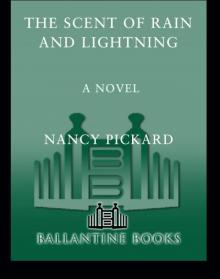 The Scent of Rain and Lightning
The Scent of Rain and Lightning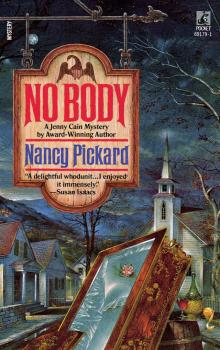 No Body
No Body The Secret Ingredient Murders: A Eugenia Potter Mystery
The Secret Ingredient Murders: A Eugenia Potter Mystery The 27-Ingredient Chili Con Carne Murders: A Eugenia Potter Mystery
The 27-Ingredient Chili Con Carne Murders: A Eugenia Potter Mystery Twilight
Twilight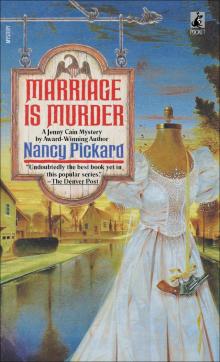 Marriage Is Murder
Marriage Is Murder I.O.U
I.O.U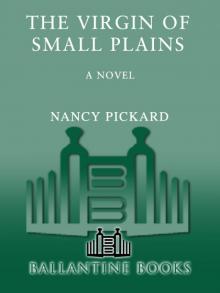 The Virgin of Small Plains
The Virgin of Small Plains Generous Death
Generous Death The Whole Truth
The Whole Truth The Blue Corn Murders
The Blue Corn Murders Say No to Murder
Say No to Murder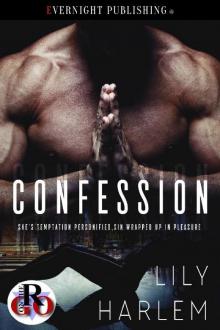 Confession
Confession Dead Crazy
Dead Crazy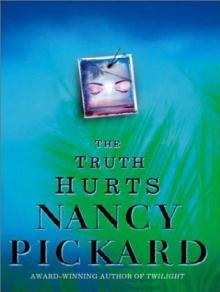 The Truth Hurts
The Truth Hurts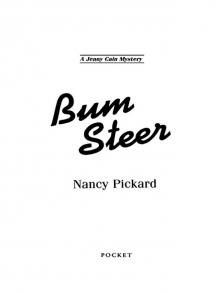 Bum Steer
Bum Steer